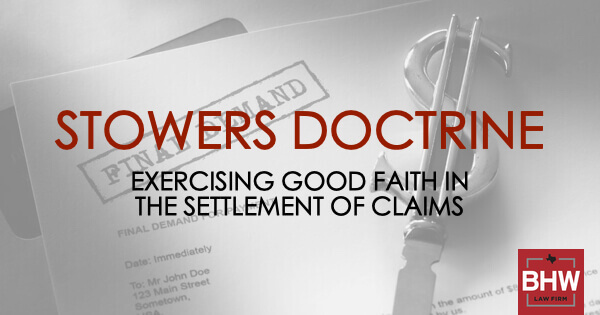 As a Fort Worth personal injury attorney, I have participated in hundreds of mediations where I represented victims of car accidents, work place negligence, defective products, assault, electrocution, and other manner of claims involving injury or death. In my experience, mediation may be the most effective tool for allowing all parties to best understand all aspects and perspectives about their case—the good, bad, and ugly—and to make an informed decision about whether to settle their case or move forward toward trial.
As a Fort Worth personal injury attorney, I have participated in hundreds of mediations where I represented victims of car accidents, work place negligence, defective products, assault, electrocution, and other manner of claims involving injury or death. In my experience, mediation may be the most effective tool for allowing all parties to best understand all aspects and perspectives about their case—the good, bad, and ugly—and to make an informed decision about whether to settle their case or move forward toward trial.
What is Mediation?
Mediation is a guided negotiation facilitated by a neutral third party, the mediator. As defined by Texas Civil Practice and Remedies Code Section 154.023:
(a) Mediation is a forum in which an impartial person, the mediator, facilitates communication between parties to promote reconciliation, settlement, or understanding among them.
(b) A mediator may not impose his own judgment on the issues for that of the parties.
Unlike a judge or an arbitrator, a mediator does not have the power to decide a case or to enter a judgment or award. Neither can a mediator force the parties to accept a settlement. Rather, the role of the mediator is to help open the lines of communication between the parties in a confidential setting.
What to Expect During a Personal Injury Mediation
Mediations frequently begin with what’s known as a “joint session” or “caucus.” The plaintiff, his or her lawyer, the defense lawyer, the insurance adjuster, and the mediator will gather in a conference room. When meeting the defendant’s representatives, I encourage my clients to shake hands and politely introduce themselves. Once the introductions have been made, the lawyers may put on brief presentations emphasizing what they feel is important about their respective cases. The parties do not put on evidence and the plaintiff will not be asked to testify. The parties will then break off into separate rooms with the defendant’s lawyer and adjuster in one room and the plaintiff and his or her attorney in another.
The mediator then spends time with each group getting to know the case and the parties involved. As a neutral third party with no stake in the outcome of the case, a mediator is in the unique position to offer a new perspective on the case. Good mediators will challenge the parties’ assertions and help them look at the case from different angles.
At some point during the process, the mediator will begin to carry demands and offers from one room to the other. The party to make the first “move” will depend on whether a demand or offer was previously extended. If the plaintiff made a demand to which the defendant never responded, the defendant should make the first move and vice-versa. Each party will respond with a counter-demand or offer of their own until the case either resolves or the parties reach an impasse.
Over the course of the mediation, the mediator will push both sides to consider potential weaknesses in their own cases while acknowledging the potential strengths of their opponents’. With each round of offers and demands, the gap between the parties will, ideally, begin to narrow until the parties are able to come together on a final number to settle the case.
What Happens if My Case Settles at Mediation?
If mediation is successful, the mediator will prepare an agreement for the participants to sign that generally sets forth the basic elements of the parties’ settlement agreement with the understanding that a more detailed and thorough agreement will be prepared by the lawyer for the defendant, subject to modifications made by the plaintiff’s lawyer. However, a mediation agreement is enforceable once signed, and either party to the agreement may require the other parties to be bound by its terms.
The mediation agreement will generally include a time frame for the defendant or its insurer to deliver checks to the plaintiff’s counsel for distribution. It is not uncommon, however, for this process to be delayed in order for the plaintiff’s lawyer to negotiate hospital liens, subrogation interests from health insurers, and outstanding medical bills.
What Happens if My Case Does Not Settle at Mediation?
When the parties are unable to reach an agreement at mediation, the mediator may make what is referred to as a “mediator’s proposal” in which the mediator proposes a settlement amount to each of the parties. The parties are instructed to confirm to the mediator by a certain date whether they accept or reject the proposal. The parties’ decisions to accept or reject are kept confidential and made known only to the mediator. Mediator’s proposals can be an effective tool when more time or settlement authority is needed to bring the case to a close.
Mediators will generally make a proposal only in cases where they feel there is at least some chance that both parties will accept. When the gap between the parties is too wide, a mediator’s proposal is unlikely to work and the parties are free to continue litigating the case or they may choose to continue negotiations with or without the assistance of the mediator. Depending on the case, the parties may choose re-mediate as the case gets closer to trial and fewer unanswered questions remain.
Even when a mediation fails to resolve the parties’ disputes, it has been my experience that almost all mediations are worthwhile experiences. The parties generally walk away from a failed mediation with a better understanding of the main issues in their case and are better able to focus their efforts going forward.










